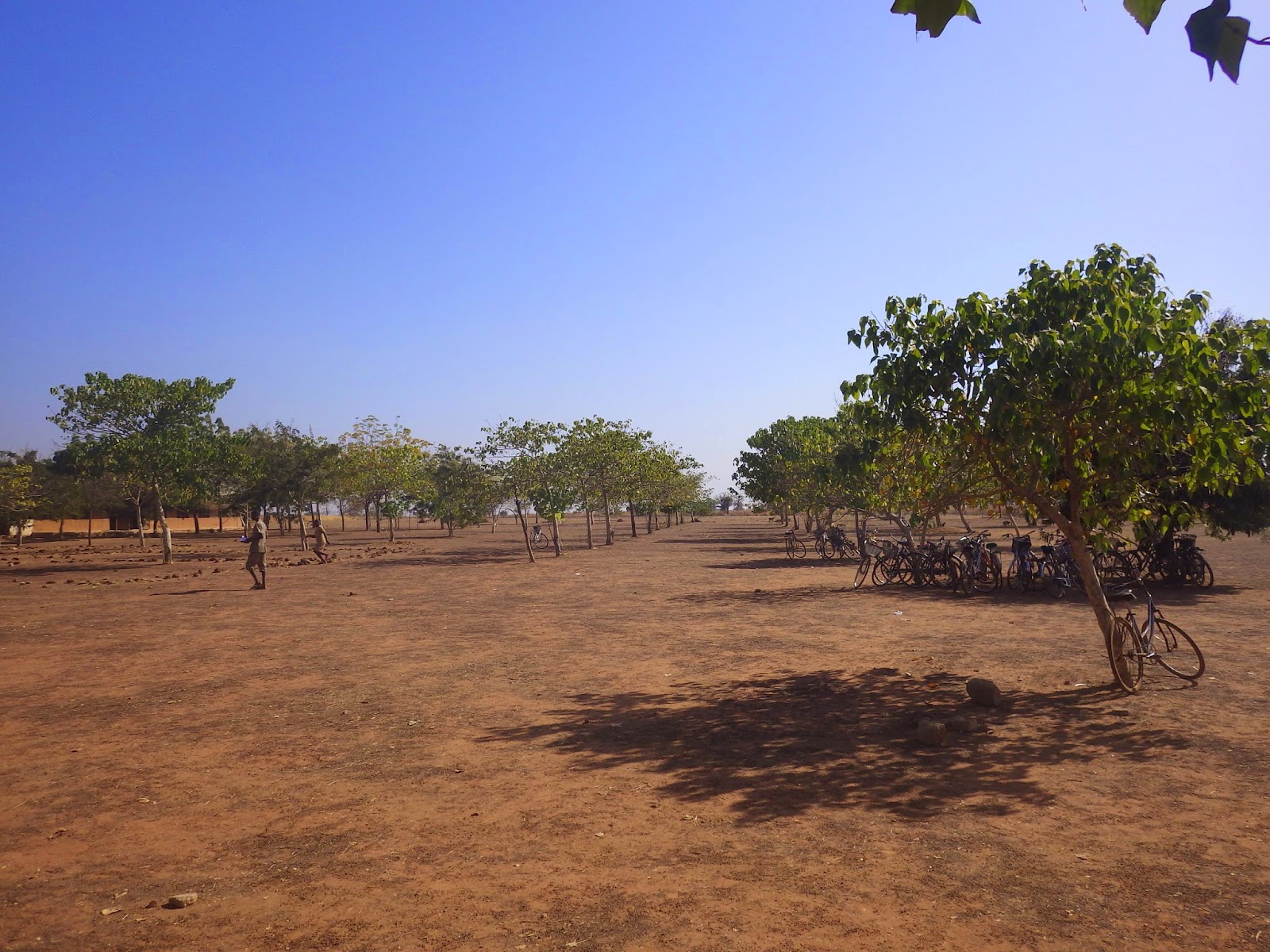Aubin with his homemade guitar
End of the year with fellow professors
Abigail and Jean
Abigail waiting
 |
| Typical Beninese Highway Travel |
 |
| Beautiful Fulani Girls Selling Wagasi, a type of Cheese |
 |
| A village home |
| Catholic Church of Dassari |
 |
| Add caption |
| View of Natitingou from the North |
 |
| People wear much more clothing now |
 |
| The School Yard |
At the end of my cinqiéme class yesterday, I asked the students to pose questions. We had reviewed the simple past that class: "I played football yesterday", "Last night, we ate rice." Now it was their turn to ask questions about the past. The first few were either simple repetitions of question I had asked earlier or rephrasing of questions on the board. But then a girl in the front row caught me off guard, "Did you eat pastèque this morning?"
"Class, is this English? No! What is pastèque?" The children looked frustrated and repeated pastèque. "C'est un fruit." Were they talking about the watermelon I ate earlier today? It was the first time I had seen watermelon in the market. A rural Beninese village tends to have, to say the least, poor access to fresh fruits. In general, with certain produce, there is no assurance as whether it will return. So, excited, I ate my watermelon in the market. And my students knew. I replied, "Yes, I ate watermelon today." (Remember, "to eat" is irregular in the simple past.)
"Another question." A boy who sits on the left, with a low brow, thick hair, and wide spread eyes asked, "Did you eat tchouk today?" First, the correction at hand—"Class, do we eat water? Do we eat café? No, we drink water. We drink café. We drink tchouk."(The English language has yet to coin a name for the stuff.)—second, how did you know I drank tchouk this morning?
The girl who sold me the watermelon told me someone was asking for me "la bas". Following the girl, I saw M. Kassa seated under the wooden hangar, around the tchouk Mama (who was revealed to be the sister of my landlord, a wonderful lunch lady Mama Oben, who is a good friend of mine. A pillar of our friendship is that she does the same, noble work as my own mother, filling the bellies of hungry students "One cannot learn on an empty stomach."), with other old men. Sit down, he demanded, "On va boire." We are going to drink. We spoke of Russia, his son is studying medicine there, of Burkina Faso, the men argued about the rank in the military of the former president Blase, of hunting, he had guided many French, Americans, and other white men who came to Africa to shoot something. And now, my student asks, did I eat tchouk today? No, I did not eat tchouk today. Did I drink tchouk today? I replied "No, I did not drink tchouk today." It was more important at the moment to emphasize the negative form of the simple past then provide an accurate grocery survey. (Remember, irregular verbs are not changed in simple past negative.) Other volunteers had warned me of this, and it snuck up on me in, thankfully, a harmless way. These kids are watching me. They know what I ate for breakfast.
In spite of past promises of what these future entries will contain, this subject appears before me and seems worth presenting: the separation of private and public life. And this is not a solely a foreign question. Perhaps you remember, as a child, in the grocery store, passing a teacher in the aisle, and the mortal embarrassment that accompanied the revelation that, can it be, that the teacher has to go shopping? The teacher is relegated to a specific space and time and having that broken is shocking. ("I always thought the teachers sleep at school.") There was a student who asked me in the first week of model school, "Do you eat?" No, I survive on chalk dust and repetition. Maybe this is the question of a minor celebrity. There are headlines (right?) "So and So Buys Cup of Coffee". They are just like us!
But this question of public and private has a bit of a different context here because I am the only American living in town. I was going to say foreigner, but there are handle of Nigerians in town (who are treated with a friendly suspicious distance). To say it simply, I receive a lot of attention. Though, in the south, it has made evident by hordes of children in various levels of dress, screaming and chasing me. Here in Dassari, the surveillance is a little more low-key. My life is a source of constant amusement for my community members, who are delighted by the successes, failures, and simple activities, like eating a piece of watermelon. The children are not screaming, but they are watching.
The point of all this is that over time, I have been trying to adjust to life and let some things become normal. It is impossible to maintain the hyper-awareness of the fragments of day-to-day life. Yes, Maurice, the infant of my favorite breakfast spot, likes to poop out front of the café in the open. And the toddlers like to sit and play next to the basins full of freshly slaughtered goat. And for a while, I forgot how closely I am watched. My whole life has become absorbed by this professional obligation to Dassari. The teacher appears as less of a profession and more as a station. It is not a matter of taking up the hammer and making the work, and when the hammer is dropped, the work is over. I am still the "teacha" when I leave school.